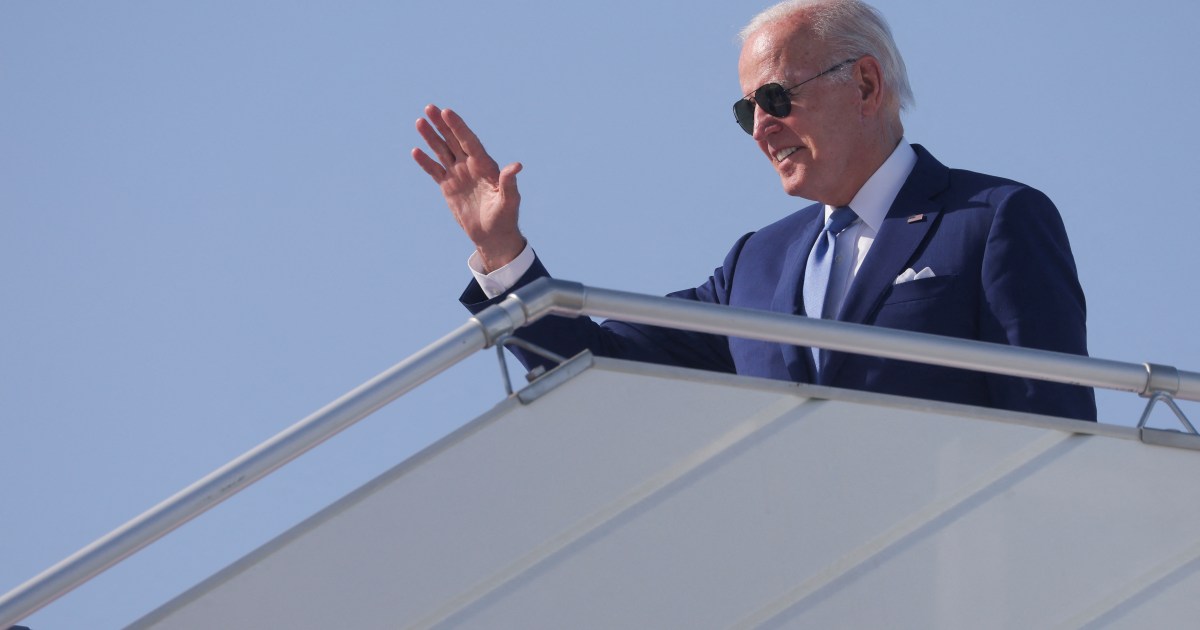US President Joe Biden left Saudi Arabia today, Saturday, concluding his first Middle East tour after taking office, during which he sought to present a new vision for the US role in this strategic region wracked by conflicts and rich in energy resources.
Today, Saudi Arabia announced the conclusion of the "Jeddah Summit for Security and Development", which witnessed the participation of the US president and leaders of the Arab Gulf states, in addition to the Jordanian king, the Egyptian president and the Iraqi prime minister.
Saudi Crown Prince Mohammed bin Salman - who chaired the summit - said in a closing speech that it "reflected the depth of the strong relations that bind our countries to each other" and the United States of America.
The summit discussed a number of files, most notably the security and energy file.
In a press conference after the summit, Saudi Foreign Minister Prince Faisal bin Farhan Al Saud said that talks with Iran had not reached their goal, and that the hand was still extended to it.
The Saudi minister pointed out that the summit did not discuss any defense alliance with Israel and there is no so-called "Arab NATO", stressing that opening the airspace has nothing to do with establishing diplomatic relations with Israel and is not a prelude to other steps.
Prince Faisal explained that the most important highlight of the Jeddah summit is the "contribution of our countries" in setting the global agenda in order to preserve their interests.
In his opening speech to the summit, the Saudi crown prince expressed his country's hope that the Jeddah summit would mark the beginning of a new era of strong strategic partnership among the countries of the region.
Prince bin Salman said that the future of energy requires a clear vision on security and stability, and finding solutions to Middle East crises, calling on Iran to contribute to achieving this vision.
For his part, the US President said that his country retains the ability and determination to eliminate "terrorist threats" around the world.
Biden added, in his speech at the Jeddah summit, that Washington will seek to strengthen its alliances and partnerships to confront "the dangers that threaten the Middle East and the world."
The US president warned of what he described as efforts to undermine the rules-based international order, and accused Tehran of committing "destabilizing acts" in the Middle East.
Biden stressed that there are new members of cooperation between the countries of the region, including Israel.
He pointed out that his administration has a clear vision of what should be done in the Middle East, and that the United States has invested in building a better future in the region.
With regard to the Iranian nuclear program, Biden stressed that his country will continue its diplomatic efforts to pressure Tehran, and will make sure that Iran does not possess nuclear weapons.
For his part, the Emir of the State of Qatar, Sheikh Tamim bin Hamad Al Thani, stressed that achieving stability in the Gulf region is important to the world.
In his speech during the Jeddah summit, he stressed that the dangers facing the region require finding a just and lasting solution to the Palestinian issue.
For his part, King Abdullah II of Jordan said that there is no security or stability in the region without a solution to the Palestinian issue and the establishment of a Palestinian state on the 1967 borders.
Abdullah II stressed the need for economic cooperation to include the Palestinian Authority.
As for Egyptian President Abdel Fattah El-Sisi, he warned of the consequences of global crises in the areas of food and climate on the Arab region and its stability.
For his part, Iraqi Prime Minister Mustafa Al-Kazemi said that his country is moving forward in supporting and strengthening dialogue among the countries of the region, as it is the only way to ensure the security of the Middle East region and its freedom from nuclear weapons.
A joint Saudi-American statement stressed the importance of strategic economic and investment cooperation, especially in light of the crisis in Ukraine and its repercussions.
This statement stated that the United States welcomed Saudi Arabia's commitment to support the balance of global oil markets in order to achieve sustainable economic growth.
The US President affirmed - according to the statement - his country's permanent commitment to supporting the security of the Kingdom, defending its lands, and facilitating its access to the necessary capabilities to defend against external threats.
The two sides also stressed the importance of preventing Tehran from obtaining a nuclear weapon, and the need to deter what they described as Iranian interference in the affairs of states.

